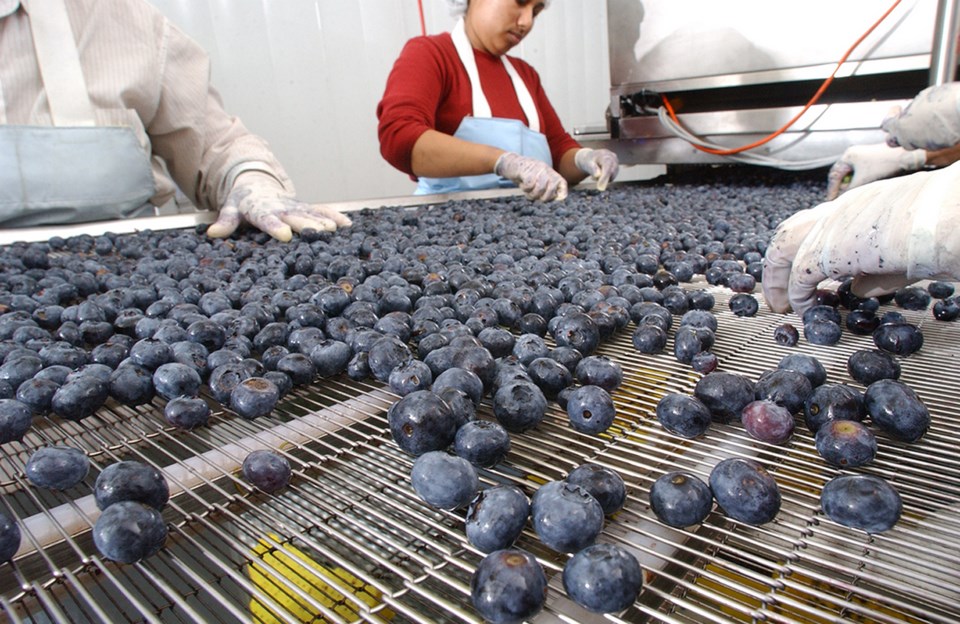It is great news for local blueberry growers who were facing the prospect U.S. tariffs or quotas.
The U.S. International Trade Commission on Thursday issued a statement that it “determined that fresh, chilled or frozen blueberries are not being imported into the United States in such increased quantities as to be a substantial cause of serious injury, or the threat of serious injury, to the domestic industry producing an article like or directly competitive with the imported article.”
The commission also stated, “As a result of today’s vote, the investigation will end, and the Commission will not recommend a remedy to the President. The Commission will submit its report containing its injury determination and the basis for it to the President by March 29, 2021.”
The determination was made following an investigation initiated last September at the request of U.S. Trade Representative Robert Lighthizer, who asked the commission to initiate a Section 201 global safeguard investigation into the extent to which increased imports of blueberries may have caused serious injury or threat to domestic blueberry growers.
The request followed the release of the “Report on Seasonal and Perishable Products in U.S. Commerce” which was authored by the Office of the U.S. Trade Representative, the U.S. Department of Commerce and the U.S. Department of Agriculture, outlining actions to support American producers of seasonal and perishable fruits and vegetables.
B.C. Blueberry Council chair and Delta farmer Jack Bates told the Optimist recently that growers were very concerned as the crop is one of B.C.’s biggest exports with over 90 per cent grown here exported to the U.S.
The B.C. Blueberry Council issued a statement saying it was pleased with the conclusion of the investigation following the commission’s review of the evidence.
“Now our members can focus on the growing year ahead, instead of being concerned with trade penalties,” remarked Bates.
Among those also quoted was John Tentomas, president and CEO of Nature’s Touch, one of B.C.’s largest exporters of blueberries into the U.S., who said, “Blueberries, both cultivated and wild, are very important industries that are fulfilling health and wellness needs of consumers in both the USA and Canada. We face the same opportunities and challenges and have managed them together, as true industry and government peers. We are thankful that this decision continues to reflect on this partnership.”
The Blueberry Council also noted that B.C. has a robust trading relationship with the U.S., with a reciprocal number of berries crossing the border in both directions each year.
The U.S. is an important market for the B.C. blueberry industry, with approximately 100 million pounds destined for the United States each season, the organization adds.
Delta North MLA Ravi Kahlon, Minister of Jobs, Economic Recovery and Innovation, and MLA Lana Popham, Minister of Agriculture, Food and Fisheries, in a statement Thursday said, “Today's decision is welcome news for B.C.'s blueberry industry, as it means B.C. blueberries will not be subject to any trade restrictions. We would like to thank the B.C. Blueberry Council and the Government of Canada for their teamwork in standing up for the interests of our blueberry farmers and their families.
“There are more than 800 blueberry growers in the province, contributing to B.C.'s jobs, economy and communities in which these farms are operating.
“We will always work closely with the federal government to protect the interests of B.C. workers and their families from any unwarranted international trade investigations and decisions in the future.”
Delta South MLA Ian Paton, the Liberal agriculture critic, said it’s certainly a good news story that tariffs have been avoided, adding B.C. as the largest grower in Canada would have been hit hardest.
Paton noted the biggest concern in the U.S. was not Canadian growers but growers in South American countries including Peru, nations that have a far lower cost of production.

